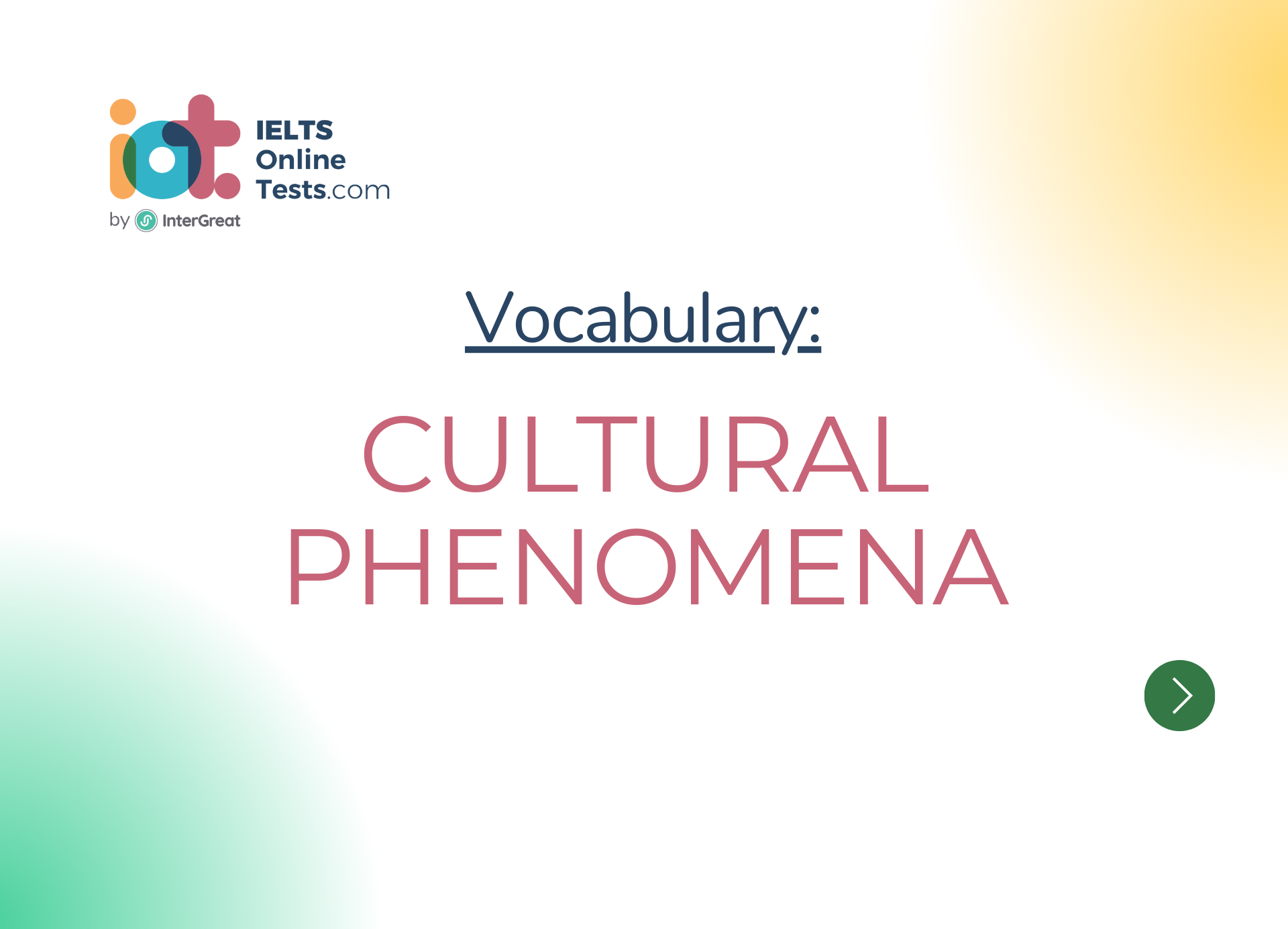
Cultural phenomena
Here are some vocabulary words related to cultural phenomena for IELTS band scores 4.5-6.0:
Cultural Diversity:
The coexistence of different cultures and ethnicities within a society or community.
Cultural Heritage:
The traditions, customs, and artifacts passed down from previous generations, representing a nation's or community's history and identity.
Cultural Exchange:
The sharing of cultural practices, traditions, and knowledge between different groups or societies.
Cultural Assimilation:
The process of adopting and integrating into a different culture, often leading to the loss of one's original cultural identity.
Cultural Integration:
The blending of various cultural elements to create a cohesive and harmonious society.
Cultural Revival:
Efforts to revive and preserve traditional cultural practices and customs that may be fading away.
Cultural Appropriation:
The adoption or use of elements from one culture by members of another culture, often without understanding or respect for their original meaning.
Cultural Sensitivity:
Being aware and respectful of cultural differences and avoiding actions that may be offensive to others.
Cultural Norms:
Accepted patterns of behavior, values, and beliefs within a particular culture or society.
Cultural Identity:
The sense of belonging and attachment to a specific culture or cultural group.
Cultural Hegemony:
The dominance of one culture over others, influencing their values, beliefs, and practices.
Cultural Symbolism:
The use of symbols to represent ideas, beliefs, or cultural traditions.
Cultural Expression:
Artistic, linguistic, or ritual practices that convey the beliefs and values of a culture.
Cultural Festival:
A celebration or event that showcases the traditions and customs of a specific culture.
Cultural Relativism:
The perspective that beliefs, customs, and values should be understood within the context of their own culture and not judged by external standards.
Cultural Integration:
The blending of various cultural elements to create a cohesive and harmonious society.
Cultural Pluralism:
The coexistence of multiple cultural groups within a society, each maintaining their unique identity and practices.
Cultural Erosion:
The gradual loss or weakening of cultural traditions and practices over time.
Cultural Awareness:
Knowledge and understanding of different cultures, promoting tolerance and respect.
Cultural Preservation:
Efforts to protect and maintain cultural heritage and traditions for future generations.
Cultural Exchange Programs:
Initiatives that facilitate the interaction and sharing of cultures between individuals or groups from different countries.
Cultural Transmission:
The passing on of cultural knowledge and practices from one generation to another.
Cultural Adaptation:
The process of adjusting to and adopting new cultural practices when exposed to a different culture.
Cultural Enrichment:
The positive impact of cultural diversity on a society, leading to new ideas, art forms, and perspectives.
Cultural Evolution:
The gradual development and transformation of cultures over time.
Cultural Fusion:
The blending of elements from different cultures to create something new and unique.
Cultural Traditions:
Long-established customs and practices that are passed down through generations.
Cultural Awareness:
Knowledge and understanding of different cultures, promoting tolerance and respect.
Cultural Sensitivity:
Being aware of and respectful towards cultural differences and avoiding actions that may be offensive to others.
Cultural Beliefs:
The shared ideas and convictions held by members of a particular culture.
Cultural Celebration:
A festive occasion that honors and showcases the cultural heritage of a community.
Cultural Change:
The transformation and evolution of cultural norms and values over time.
Cultural Identity:
The sense of belonging and attachment to a specific culture or cultural group.
Cultural Impact:
The influence that one culture has on another, shaping beliefs, behaviors, and practices.
Cultural Integration:
The process of incorporating various cultural elements to foster social harmony and unity.
Cultural Sensitivity Training:
Educational programs that promote understanding and empathy towards different cultures.
Cultural Symbolism:
The use of symbols to convey meaning and represent cultural ideas or concepts.
Cultural Landscape:
The visible features of an area shaped by the interaction of humans and their environment, reflecting cultural practices and beliefs.
Cultural Exchange Programs:
Initiatives that facilitate the interaction and sharing of cultures between individuals or groups from different countries.
Cultural Heritage Sites:
Places of significant cultural value and historical importance that are preserved for future generations.
Cultural Diplomacy:
The use of cultural interactions and exchanges to foster understanding and cooperation between nations.
Cultural Practices:
The behaviors and rituals that define the way of life within a specific culture.
Cultural Stereotypes:
Overgeneralized beliefs and assumptions about a particular cultural group.
Cultural Mosaic:
A society or community that embraces and celebrates its diverse cultural backgrounds.
Cultural Syncretism:
The merging of different cultural elements to form a new cultural identity.
Cultural Revitalization:
Efforts to revive and promote traditional cultural practices that have been declining.
Cultural Continuity:
The preservation and continuation of cultural practices across generations.
Cultural Rituals:
Formalized ceremonies and actions performed within a cultural context.
Cultural Significance:
The importance and impact of cultural practices and traditions on a community's identity.
Cultural Understanding:
The comprehension and appreciation of different cultures, fostering global harmony and cooperation.
These vocabulary words will help you discuss various cultural phenomena and concepts in your IELTS writing and speaking tasks. Make sure to practice using them in different contexts to improve your language skills effectively. Good luck with your preparation!




